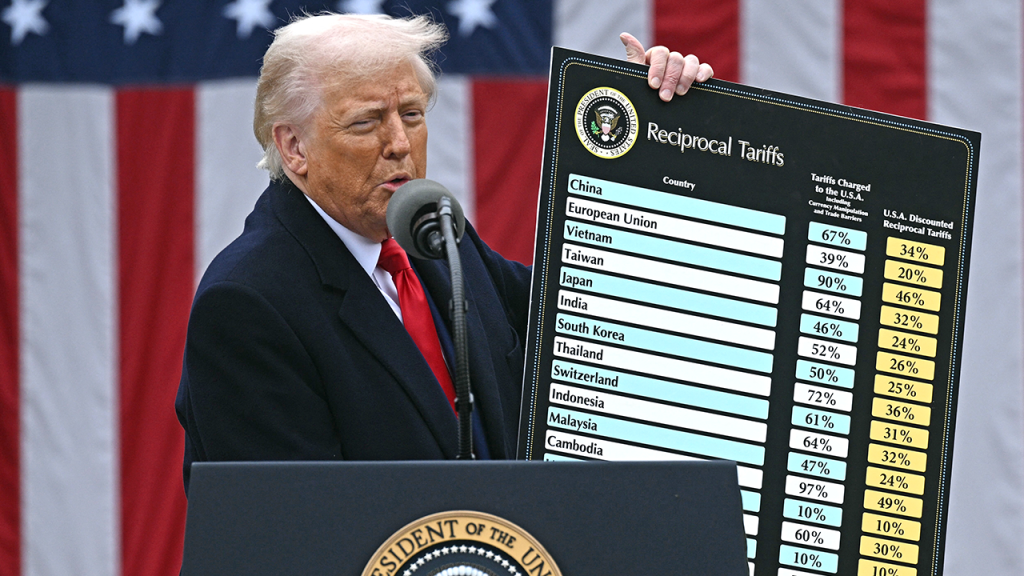World leaders are responding to President Donald Trump’s recent tariff announcements, which he refers to as “Liberation Day” tariffs. These measures include a baseline tariff of 10% on imports, coupled with reciprocal tariffs based on each nation’s import taxes on U.S. goods. While the tariffs are aimed at boosting foreign investment and domestic job growth, many nations express disappointment, with some hinting at potential retaliatory actions as they seek new trade agreements with the U.S. amidst growing global trade tensions.
| Article Subheadings |
|---|
| 1) Overview of the Tariff Announcements |
| 2) Global Reactions to Tariffs |
| 3) Implications for U.S. Trade Partners |
| 4) Response from Economic Stakeholders |
| 5) The Path Ahead for International Trade Relations |
Overview of the Tariff Announcements
On April 2, 2025, President Donald Trump announced new tariffs during an event in the White House’s Rose Garden titled “Make America Wealthy Again.” The baseline tariff set at 10% applies to all imports, with additional reciprocal tariffs imposed depending on what other nations charge for U.S. goods. This aggressive stance aims to incentivize foreign companies to invest in the U.S. economy primarily by making American products comparatively cheaper, thus spurring job growth within the country. Trump has positioned these tariffs as a strategic move to address a trade imbalance that he believes has persisted too long, harming American industries.
Global Reactions to Tariffs
Following Trump’s announcement, leaders around the globe expressed concern and dissatisfaction. European Commission President Ursula von der Leyen labeled the tariffs a “major blow to the world economy,” hinting at potential “countermeasures” from Europe. The Chinese Foreign Ministry weighed in, indicating the futility of tariff wars, emphasizing that such conflicts yield no winners. As a direct response, Beijing announced plans for its own countermeasures, targeting goods already subject to significant tariffs, including a 34% reciprocal tariff on U.S. products—a substantial increase from previous tariffs. This reaction underscores a growing unease about the escalating trade disputes and the anticipated repercussions on global markets.
Implications for U.S. Trade Partners
The diplomatic ramifications of these tariffs are profound for U.S. allies. Japanese Prime Minister Shigeru Ishiba has signaled how tariffs will adversely affect U.S.-Japan relations, suggesting a strong commitment from Japan to protect its domestic workforce and industries. In a similar vein, Australian Prime Minister Anthony Albanese acknowledged the low reciprocal tariffs but expressed a desire for negotiations rather than escalating tensions through trade wars. Both Canada and Mexico were initially exempted from reciprocal tariffs but still face stiff levies, prompting leaders such as Canadian Prime Minister Mark Carney to consider countermeasures. Mexico’s President Claudia Sheinbaum has committed to unveiling a “comprehensive program” in response to the tariffs, reflecting the widespread concern among neighboring nations on the potential long-term impacts on trade dynamics.
Response from Economic Stakeholders
The economic implications of the tariffs extend beyond political leaders, affecting businesses and consumers directly. Economists are concerned that these tariffs could lead to higher prices for consumers and slower economic growth, as costs incurred by importers may be passed down to the average American. The markets have reacted cautiously, reflecting uncertainty about the effectiveness of Trump’s strategy and the potential for escalating trade conflicts that could spiral out of control. Trade organizations and business consortiums are advocating for dialogue with the Trump administration, emphasizing the need for stability in international trade policies that protect both domestic and foreign investments.
The Path Ahead for International Trade Relations
As countries mull their responses to the tariffs, the potential for negotiations has emerged as a crucial next step. Many leaders have expressed a willingness to engage in talks to establish fair trade agreements that would alleviate concerns about tariffs while promoting mutual economic benefits. The willingness of countries to cooperate rather than retaliate has been a significant theme within diplomatic circles as they seek to navigate this complex landscape. The outcome of these discussions will not only determine the trajectory of U.S. trade but could also influence global economic stability for years to come.
| No. | Key Points |
|---|---|
| 1 | President Trump has introduced a baseline tariff of 10% on imports, aiming to encourage domestic job growth. |
| 2 | International leaders have reacted with disappointment and some have threatened retaliation in trade relations. |
| 3 | China plans reciprocal tariffs, which will greatly increase the cost of U.S. imports, including a new 34% tariff. |
| 4 | Allies like Japan and Australia are seeking negotiations to avoid trade wars and stabilize relations. |
| 5 | The long-term effects of these tariffs on global trade remain uncertain, with calls for cooperative solutions being emphasized by many leaders. |
Summary
The recent tariff announcements by President Trump have sparked significant response from international leaders, highlighting a critical moment in global trade relations. The varying reactions—ranging from disappointment to threats of countermeasures—demonstrate the complexities of the current trade landscape. As nations navigate through these challenges, discussions on negotiations could pave the way for a more stable and beneficial approach to international trade. Ultimately, the effectiveness and consequences of these tariffs will be closely monitored, with implications that could reach far beyond immediate economic outcomes.
Frequently Asked Questions
Question: What are the new tariffs announced by President Trump?
President Trump announced a baseline tariff of 10% on all imports, along with reciprocal tariffs based on the tariffs other nations impose on U.S. goods.
Question: How are foreign leaders responding to these tariffs?
Foreign leaders have expressed dissatisfaction, with some describing the tariffs as harmful to the global economy, while others are considering countermeasures to defend their economic interests.
Question: What potential impacts could these tariffs have on U.S. consumers?
These tariffs could potentially lead to higher prices for consumers as businesses may pass on the costs associated with tariffs, which could also contribute to slower economic growth.


